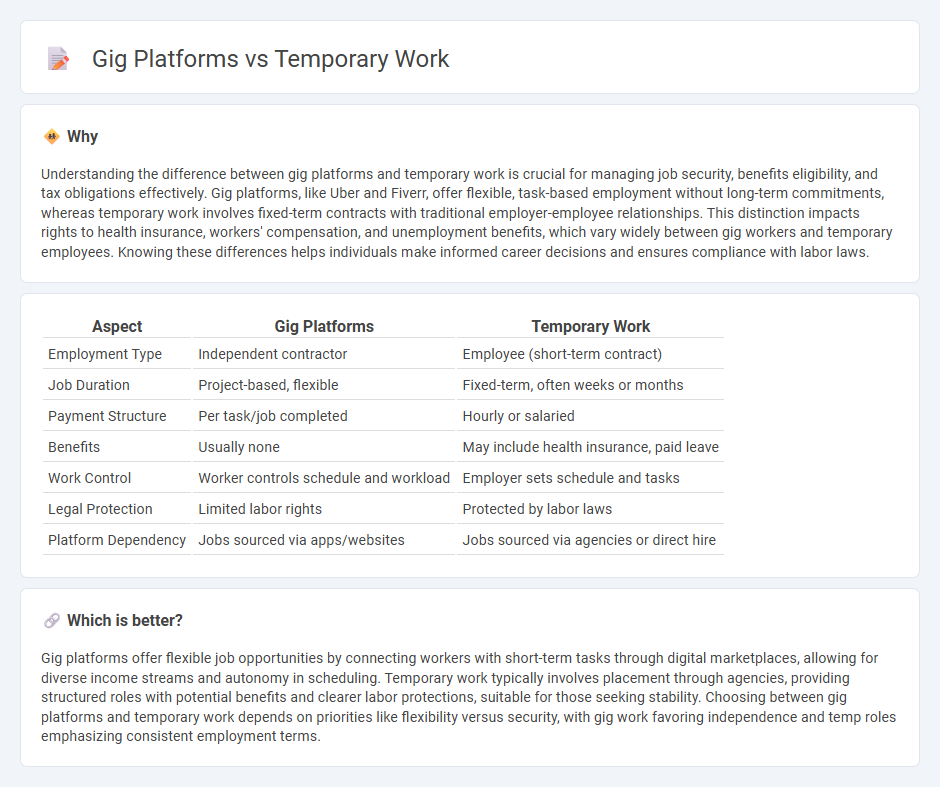
Gig platforms offer flexible, technology-driven access to short-term jobs that cater to independent contractors, while temporary work typically involves placement through staffing agencies for fixed-duration roles within established companies. Gig economy workers benefit from direct client interactions via digital apps, whereas temporary employees often receive traditional employment benefits and structured schedules. Explore the nuances between gig platforms and temporary work to discover which suits your career goals best.
Why it is important
Understanding the difference between gig platforms and temporary work is crucial for managing job security, benefits eligibility, and tax obligations effectively. Gig platforms, like Uber and Fiverr, offer flexible, task-based employment without long-term commitments, whereas temporary work involves fixed-term contracts with traditional employer-employee relationships. This distinction impacts rights to health insurance, workers' compensation, and unemployment benefits, which vary widely between gig workers and temporary employees. Knowing these differences helps individuals make informed career decisions and ensures compliance with labor laws.
Comparison Table
| Aspect | Gig Platforms | Temporary Work |
|---|---|---|
| Employment Type | Independent contractor | Employee (short-term contract) |
| Job Duration | Project-based, flexible | Fixed-term, often weeks or months |
| Payment Structure | Per task/job completed | Hourly or salaried |
| Benefits | Usually none | May include health insurance, paid leave |
| Work Control | Worker controls schedule and workload | Employer sets schedule and tasks |
| Legal Protection | Limited labor rights | Protected by labor laws |
| Platform Dependency | Jobs sourced via apps/websites | Jobs sourced via agencies or direct hire |
Which is better?
Gig platforms offer flexible job opportunities by connecting workers with short-term tasks through digital marketplaces, allowing for diverse income streams and autonomy in scheduling. Temporary work typically involves placement through agencies, providing structured roles with potential benefits and clearer labor protections, suitable for those seeking stability. Choosing between gig platforms and temporary work depends on priorities like flexibility versus security, with gig work favoring independence and temp roles emphasizing consistent employment terms.
Connection
Gig platforms leverage digital technology to match workers with short-term or temporary jobs, streamlining access to flexible employment opportunities. Temporary work on these platforms often fills immediate labor demands across various industries, enhancing workforce agility. This connection supports a shift toward on-demand labor markets, benefiting both employers seeking rapid staffing and workers favoring non-permanent roles.
Key Terms
Contract Duration
Temporary work typically involves contracts lasting from a few weeks to several months, providing short-term employment with defined end dates. Gig platforms offer flexible, often project-based tasks that can vary greatly in duration, from hours to ongoing assignments, depending on worker availability and client demand. Explore more to understand how contract duration impacts job stability and income predictability.
Flexibility
Temporary work offers structured assignments with predefined durations, providing workers with consistent but time-bound flexibility. Gig platforms enhance flexibility by allowing users to select tasks based on their schedules and preferences, often without long-term commitments. Explore more to understand which option best fits your lifestyle and career goals.
Intermediary Platform
Intermediary platforms in temporary work and gig markets facilitate connections between employers and workers, streamlining job matching through digital interfaces and automated processes. These platforms manage transactional elements such as payment processing, contract enforcement, and worker evaluations to ensure reliability and trust. Explore how intermediary platforms are transforming workforce dynamics and creating flexible employment opportunities.
Source and External Links
Temporary work - Wikipedia - Temporary work, also known as temporary employment or gigs, refers to employment for a limited period based on employer needs, involving roles such as contractual, seasonal, interim, or freelance positions, with some temporary workers receiving benefits while others do not; this form of work is commonly facilitated by temporary work agencies or volunteer marketplaces in the gig economy.
Temporary Jobs in Rochester Hills, MI - Indeed - Current temporary jobs in Rochester Hills, MI, include positions like customer service representatives and farm assistants, offering roles with part-time schedules and generally without benefits.
Temporary Jobs in Michigan - ZipRecruiter - Job listings for temporary roles across Michigan show a variety of positions, including part-time temporary jobs at institutions like Central Michigan University paying around $17/hr, reflecting the availability of short-term employment opportunities in numerous fields.
 dowidth.com
dowidth.com